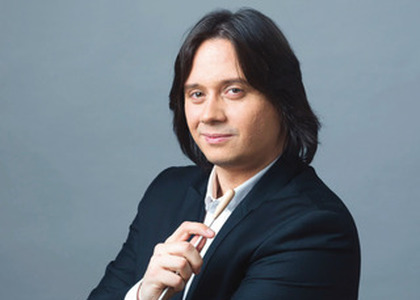> Interviews

Interview with conductor Gabriel Bebeșelea
On Wednesday, the 20th of March 2023, the Radio Chamber Orchestra will be performing on the stage of the Radio Hall, with violinist AlexandruTomescu as soloist, in a full Mozart program. The conducting part will be played by Gabriel Bebeșelea, who gives us more information about the event during an interview with our colleague, Sarah Natsis:
Mr. Gabriel Bebeșelea, you'll be returning to the conductor's stand of the Radio Chamber Orchestra. What is a defining characteristic of the ensemble and how do you feel about working with its members?
It's great to be back after a few years with the Radio Chamber Orchestra, with which I've done a lot of recordings and special concerts before. I think that its defining characteristic is, as the name suggests, the fact that we can make better chamber music. It's much easier for us to communicate, because it's a smaller orchestral ensemble and we can get that continuous flow between every one of its members.
I've found out from one of your previous interviews that Mozart's music has a special place in your heart, ever since childhood. The program for the audience at the Radio Hall is entirely Mozartian. How would you describe the works it contains?
There is a common link between these works and that is "Prague". I'd like to start from the end of the concert, from the "Prague Symphony" (Symphony No. 38 in D major), one of the most intricate and filigree works ever composed by Mozart, which is closely connected to the first work of the concert, which is the Overture to "Don Giovanni", written by Mozart on the day of the premiere of this absolutely fascinating and spectacular opera that took place in Prague. The work that actually inspired the making of the whole program was the "Violin Concerto No. 2 in D major", performed by the amazing violinist AlexandruTomescu. The entire evening revolves around the same tonality, D major, which was the tonality of triumph in Mozart's days.
As you've mentioned earlier, the evening's soloist will be violinist AlexandruTomescu, whom you've worked with before. What can you tell us about your artistic relationship?
Every time I get to be back on stage with Alexandru Tomescu, there's something special about the works we play together. The last time we were together was also at the Radio Hall for the Glazunov concert and it was an extremely touching musical experience. I expect this Mozart one to be just as finely and elegantly interpreted.
During your formative period you had the chance of studying alongside great names of the conducting world. What's that one great principle that they've passed on to you and that you still live by?
There's an entire list of things that I've learned and that I'm still learning, but perhaps the most important, if I am to refer strictly to this Mozart repertoire, would be what Bernard Haitink said to me that 'less is more', that you can get a better effect from less and that efficiency, not only in practice, but more so in the way gestures are delivered, is important for focusing the sound and transmitting it straight to the audience.
Translated by Raluca Daniela Miloș,
University of Bucharest, Faculty of Foreign Languages and Literatures, MTTLC, year I
Corrected by Silvia Petrescu














